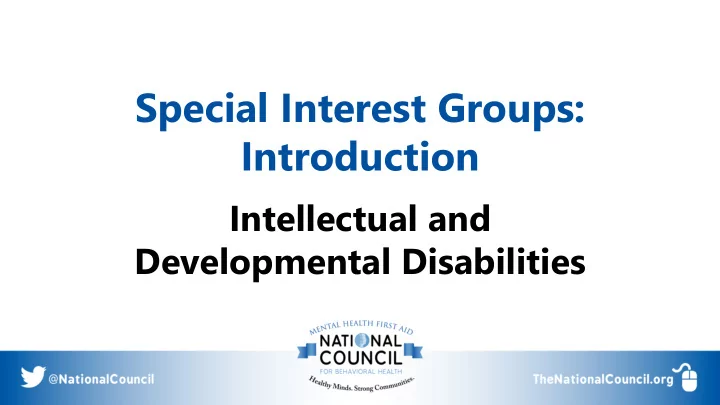

Special Interest Groups: Introduction Intellectual and Developmental Disabilities
Introductions Nicole Cadovius Director, Practice Improvement National Council for Behavioral Health Washington, D.C.
Agenda for Today’s Meeting 1. Introductions 2. Purpose of the Group 3. We Want to Hear from You 4. Brainstorming Discussion Topics 5. Content Expectations & Engagement 6. In-Person Meeting at NatCon20 7. Proposed Meeting Schedule
Quick Facts on Intellectual and Developmental Disabilities • It is estimated that the rate of mental health conditions for those with IDD is 2x to 3x higher than for the general population. • About 1 in 68 children has been identified with autism spectrum disorder. In the US, this is a 30% increase from 2008 to 2010. • A recent study found over 40% of a cohort of 1,318 adults with IDD were diagnosed with 4 or more comorbidities, including 18% diagnosed with anxiety disorder and 17.8% with depression. • It is estimated 850,600 people with IDD age 60 and older are living in the US, and their numbers will likely double over the next two decades as members of the “baby boomer” generation reach retirement age. • Average life expectancy of people with developmental disabilities was just 22 years in 1931, compared to 59 years in 1976, and 66 years in 1993. One study found the average age of death for persons with IDD is now 63.3 years for males and 69.9 years for females. • Individuals have limited communication skills and this limitation makes it difficult or impossible for them to describe their own experiences accurately to the clinician.
About the National Council for Behavioral Health We are the unifying voice of America’s health care organizations that deliver mental health and addictions treatment and services. Together with our 3,326 members, we are fighting to ensure all Americans have access to comprehensive, high- quality care that affords every opportunity for recovery. Join us for our annual conference! Visit www.thenationalcouncil.org to learn more! Visit www.NatCon20.org for details.
Purpose of the Group We’re launching our Special Interest Groups initiative with you in mind. Our goal is to give you the tools, knowledge and networks you need to accelerate your understanding of, and impact in, your area of interest. What can you expect? Throughout 2020, we will share resources, publish content and hold conversations around all- things intellectual and developmental disabilities within the behavioral health care space. This is your chance to stay atop of political and social issues, address emerging trends, receive new learning, connect with likeminded peers and move the conversation forward.
We Want to Hear from You We are conducting this webinar to better understand your needs and expectations around this area of interest. To help us support your learning journey in 2020, we want to know: • What about this group interests you? • What are you hoping to get out of this group? • What do you want to learn more about within this group? • What type of knowledge or resources will benefit you in your role? As interested members, you will help drive and define this group through your participation. By sharing your feedback, you will help us deliver the best possible learning experience.
Brainstorming Discussion Topics Throughout 2020, we will highlight various topics and issues within the “Intellectual and Developmental Disabilities” (IDD) group. Examples include: Best practices in supporting individuals with IDD and Dementia • Person centered planning for individuals with IDD and Mental health • support needs Trauma informed care, recognizing trauma as a contributing factor to • challenging behaviors seen in children with IDD and complex mental health needs Community based supported employment • To help us define our year-long agenda, we want to know: What would you like to see covered next year? • What topics within this group interest you the most? • What are your learning goals for the year? •
Content Expectations & Engagement We are committed to helping you learn and grow. To keep you informed, we will deliver the following throughout the year: • Regularly published content (e.g., blog posts) • Webinars offering insights into your group • Calls to help further the conversation • A special NatCon20 networking opportunity • A platform for sharing your ideas and input We want to know : What else can we do to support your learning experience?
In-Person Meeting at NatCon20 There will be multiple touchpoints throughout the year to discuss and explore topics within this group. Of note is a special networking and learning session at NatCon20 in Austin, Texas, to be held April 5-7. This is your chance to connect with colleagues, build your network and lead the conversation around this interest area. Learn more by visiting www.natcon20.org What would you like to experience during this on-site event? How can we make this meeting impactful for you?
Proposed Meeting Schedule (Bi-Monthly) To keep the conversation going, we will conduct bi-monthly chats starting in February. Meeting Month Group Activity At left is a tentative schedule outlining our February 2020 Meeting with Community conversations around this area of interest. April 2020 Meet and Greet at NatCon2020 June 2020 Meeting with Community • Is this level of engagement helpful? August 2020 Meeting with Community • Have any agenda ideas? October 2020 Meeting with Community December 2020 Meeting with Community Within this group, we will explore behavioral health care and move the field forward.
Q&A
Recommend
More recommend